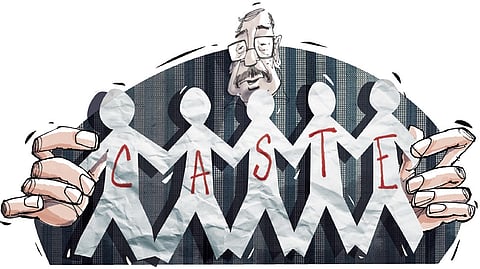

KOTTAYAM: The racial remarks by Kalamandalam Sathyabhama against Mohiniyattam performer RLV Ramakrishnan brought to light the caste-based discrimination that is deep-rooted in Kerala society. Many face bias because they hail from the “wrong” caste.
Some 40 Muslim families in Changanassery are among those at the receiving end of this prejudice. Labelled Keezhnadappukar, or lower section of the community, the families continue to struggle to get equal treatment and recognition from their own, despite directives from constitutional bodies asking those concerned to recognise their rights.
The discrimination faced by the Osthan, Labbai, and Modeen communities from the Puthoorpally Muslim Jama-at in Changanassery came to light when Aneesh Sali, who resides within Puthoorpally mosque limits, attended a general body meeting there on July 2, 2023. It was over a road dispute, hence Aneesh attended the meeting and signed the register.
A couple of days later, he received a letter from the Jama-at committee. It said, “Your ancestors and their descendants have not traditionally attended general body meetings. As outlined in section 16, sub-section ‘f’ (of the Jama-at Constitution), you are classified as members under the category of ‘Keezhnadappukar.’ Your presence at the meeting was considered a mistake and should not happen again.”
Aneesh belongs to ‘Osthan’ community, who are traditionally barbers by profession. Labbai community members are engaged in leading funeral-related services, while those in Modeen community are responsible for the prayer call, (‘adhan’ or ‘bankuvili’).
The letter left Aneesh feeling perplexed and disappointed. he soon filed a petition before the Kerala Waqf Board against the communication. He secured a favourable order, but was denied permission by the Jama-at to attend the next general body meeting held last October.
Then, the divisional waqf officer in Kottayam issued a directive to the Jama-at to comply with the board’s order. The committee disregarded it. Then, Aneesh and 11 other people, including office-bearers of the Muslim Equality Empower Movement (MEEM), filed an interlocutory application (IA) with the Kerala Waqf Board seeking criminal proceedings against M H M Haneefa, secretary of the Jama-at.
On February 28, for the first time in Kerala, the board issued an order to initiate prosecution action against Haneefa under Section 61 (F) of the Waqf Act, 1995, for caste bias. It also directed the divisional waqf officer in Kottayam to file a prosecution case against the Jama-at.
However, justice still eludes the community members as the Jama-at has appealed the board order before the Kerala Waqf Tribunal in Kozhikode. Though Aneesh also lodged a complaint during Nava Kerala Sadas last December highlighting the discrimination, no action has been taken on his plea yet.
The Jama-at has denied allegations of caste discrimination. “As per the Jama-at constitution, individuals from the three sections are classified as Keezhnadappukar, which does not imply lower caste status. While they are not allowed to attend general body meetings as per the constitution, they are permitted to attend prayers, and avail wedding and funeral services,” said Haneefa.
He said a ‘by-law’ committee will be established after Ramadan to address the communities’ request.
“We are considering amending the constitution to allow them to attend general body meetings. Though they will get voting rights, they will not be able to join the administrative council as they lack ‘Moulid’ rights,” he said.